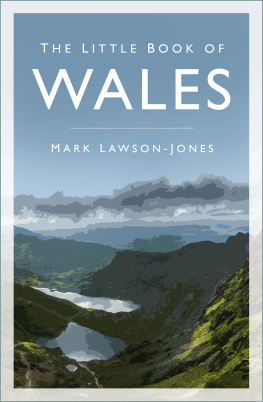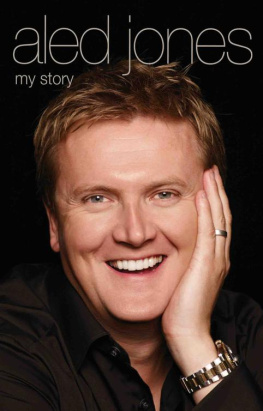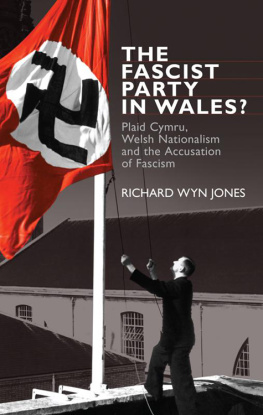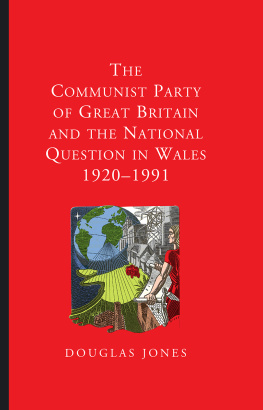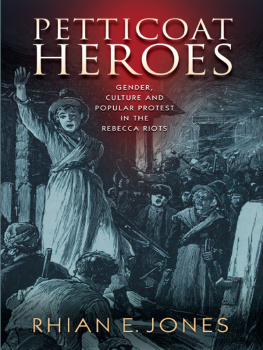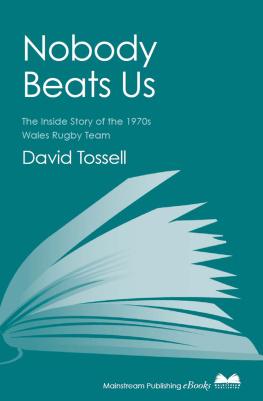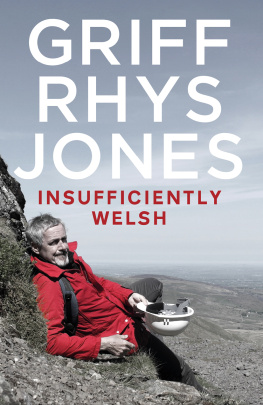
Published by SportsBooks Limited
Copyright Steve Lewis 2011
September 2011
This ebook edition first published in 2011
The right of Steve Lewis to be identified as author of this work has been asserted in accordance with Section 77 of the Copyright, Designs and Patents Act 1988
This ebook is copyright material and must not be copied, reproduced, transferred, distributed, leased, licensed or publicly performed or used in any way except as specifically permitted in writing by the publishers, as allowed under the terms and conditions under which it was purchased or as strictly permitted by applicable copyright law. Any unauthorised distribution or use of this text may be a direct infringement of the authors and publishers rights, and those responsible may be liable in law accordingly
Cover design by Alan Hunns
ISBN 9781907524264
For the town and people of Blaenavon, always close to Ken Jones heart
FOREWORD
K en was not only murderously fast and fearless in the tackle but he possessed a razor-sharp sense of anticipation. When you watched him play you felt the tingling of the spine the prickling of the scalp. He was world class. These were the priceless words of that immortal centre of Wales and the world, Bleddyn Williams, in memory of Ken Jones.
For me, Ken left an indelible fingerprint on everything he touched in his life. He was modest, unassuming, had great charm and never wore his abundant and creative talents on his sleeve. His love of virtue and his sense of duty and loyalty to his fellow man singled him out as a special person. His life touched not only those who were close to him but the many thousands he thrilled and entertained in sprinting for Wales and Great Britain and winning a silver medal in the 4x100m relay at the Olympic Games in 1948 in London. Then there were the many thrilling tries he scored for Newport and Wales and again for the Lions in 1950 in New Zealand.
I was proud and fortunate to have played with him and against him for there was little to compare in those days with the Newport and Cardiff fixtures. We actually played against each other four times every season in the 50s to packed houses. We all felt privileged to be part of something special. I remember with enormous warmth, after my first game for Cardiff at Rodney Parade, Ken taking me and John Phillips to the tearoom. I can promise you the most delicious cup of tea and a scrumptious meal all made by the wives and sweethearts of the Newport club, said Ken. It was, indeed, for me wonderful and unforgettable.
I was lucky too, to play many international matches with Ken and still have vivid memories of the 1952 England match at Twickenham when Wales were not expected to win. I always hoped to get into the same compartment as Ken when we were travelling, be it to Edinburgh, Paris, Dublin or London, for I knew there would be good conversation and treasured stories. En route to Twickenham, the day before the match, Ken said he would like to score a try that would be as famous as the one scored in 1936 by the Russian, Prince Obolensky, playing for England against New Zealand. The great Obolensky sped from one touchline, across the field to the other. It will, for ever be talked about, said Ken. In all the good record books you can now read that the very next day, Ken Jones ran from our own 25-yard line (these were in the days before metres), outstripped the England defence and scored near the corner flag. A few weeks later in Dublin, he repeated that 70-yard run from our own line and dived over to score and Wales won the Triple Crown; and how many times in the past 50 and more years have I retold the story of those two magnificent tries!
In 1953, the last time Wales beat New Zealand, it was Ken who scored the try that gave us the win. Clem Thomas cross kicked, Ken Jones chased and gathered the ball, side-stepped Ron Jarden and touched down under the posts. He shone like a glittering star and his passion for rugby never faltered.
Ken was, indeed, the complete athlete but I also admired his true sense of values. He adored his role as a teacher and firmly believed in education and felt that caring for young people was a most honourable and rewarding job that could help to set standards for the future generation. He firmly believed that bad behaviour, jealousy and greed were destructive emotions and that mediocrity was second rate. Ken was first rate.
He felt exactly the same about the craft of journalism, which he also mastered. He was a natural presence in the press box and his articles on rugby made you think that the game was worthwhile a game of chance so dramatically and romantically played. In fact the stuff of which dreams are made.
In the autumn of 1977, we were both at a match at Newport and in the clubhouse later, in our usual gathering for a chat and the cool comfort of a few beers, Ken asked me to relate a story about Jesse Owens, of the United States, one of the greatest Olympians of all time. I had been at a press conference at the 1976 Olympics in Montreal when a young journalist challenged Jesse, asking him if there was any future in pursuing the principles of the Olympic Games when there was so much cruelty, greed, jealousy, starvation and poverty all around the world. Was the Olympic Games worth preserving? This is what Jesse Owens replied: Take a look at whats happening out there on the field today. This is where youngsters break bread together, they sing together, they dance together and they play together. The only body in the world where you can find the youth of the world that can come together on a friendly field of competition. Youve got the United Nations and they havent solved a damned thing but you do solve something here. You solve a championship of the world and youre not breaking heads, youre breaking records and this is why it is going to endure because the youth of the world is going to be the leadership of the world in not too many years from today and the things that he learns right here today he is going to take back to his land in his own mind and they are going to live for ever because they are great moments. Whether you win, whether you qualify, in the finals or not you were here. You broke bread with the rest of the world.
As I told that story Ken smiled, for though I had told him this tale before he wanted to hear it again. For Ken, the supreme athlete, the dedicated teacher, the talented journalist and, above all, a loving and caring family man, the words of Jesse Owens very much reflected his own philosophy on life.
I am proud to call Ken Jones my friend and he will live in my heart for ever. I am sure when you have read this book you will understand why.
Cliff Morgan
ACKNOWLEDGEMENTS
W hen considering who might lay claim to being Wales finest all-round sportsman the name Ken Jones must be on every shortlist and after much discussion it would be difficult to come to any conclusion other than that the man from Blaenavon should top the list. Strange then that the life of such an outstanding performer on both the rugby field and running track was not to be found among the many biographies that dominate the sports sections in shops and libraries. When the opportunity to write an autobiography was presented Ken declined politely, which says much about the man; but his is a story that needs telling, such is the magnitude of his many achievements.
Before setting out on such a project it is vitally important to receive the total support of the subjects nearest and dearest. For this, the interest shown from the outset by Kens widow Irene and son Philip never faltered. Without their commitment the story could not be told. It is easy to reminisce about the international caps, the athletics medals and much else but revisiting the darker days that followed Kens stroke could not have been a comfortable experience. I am indebted to them both.
Next page



